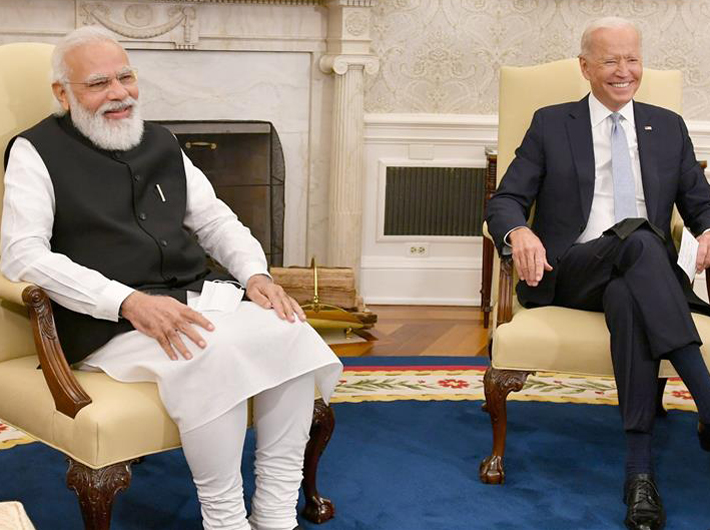Ties between India and the United States of America subsist on a substratum of “shared values” wherein the life practices of the order of rule of law, democratization of tyrant nations and despots, liberalism and avid espousal of constitutionalism amount to the elements of foreign policy convergence. On a theoretical level, cooperation between New Delhi and Washington are on a strategic cusp with grandiose adjectives such as “the all consequential relationship” along with other sobriquets such as, “a special relationship” as spawned by former president Donald Trump. In this context, prime minister Narendra Modi’s upcoming United States visit is more than merely symbolic in nature and political-diplomatic veneer. The expectations are at a high diplomatic perch this time around as a slew of treaties premised upon defence cooperation are on the anvil as an outcome of the PM’s trip to the American homeland.
Symbolism and hyperbole are the positive mainstays of PM Modi’s diplomacy which is steadily perched upon the instrument of soft power. The ‘New India’ now showcases its power, strength and cooperative inclinations to the global comity of nations and does a successful diplomatic tightrope walk while balancing powers of the order of the US and Russia in the post Ukraine war context. Intelligence based agreements such as LEMOA, BECA and COMCASA were the receptacle elements which formed the foundational elements of an on an upswing bilateral relationship and now a mutually symbiotic partnership. The DTTI initiative launched in 2012 also has been further strengthened by both the nations which will be utilised as an able vehicle to clinch deals in the larger and contemporary context of defence and dual technology transfers to New Delhi for a deeper and much more nuanced strategic and defence partnership between both the democracies of the larger international system.
In his visits to the Madison Square garden in the not-too-distant past, PM Modi amplified and introduced the Indian Dream and the plausible planning which has rendered good consequences for the Indian nation. In his visit to the Shark Tank, Houston, the Indian head of government signed multiple agreements with the American energy trade big wigs. Later he hosted the then president Trump at the Motera stadium in Ahmedabad in February 2020 in order to cement and flower the now realism and moralism imbued partnership between the oldest and the largest democracies of the world. India is embarked on a road to ‘Make in India’ in tandem with its colossal national objective of Atmanirbhar Bharat which is not a knee-deep and shallow clarion call. The entire striving of the New Delhi denomination is perched atop the ‘Make in India’ tiger which has begun yielding dividends to the Indian nation in tandem with its larger developmental agenda.
The US Ambassador to India, Eric Garcetti, has welcomed the diplomatic parleys undertaken by both nations which are battling out a transformed and vitriolic international environment. On an official keel, he went on to contend that, “we want to help India have the most secure kind of cyber environment that it can because we know there are malicious actors, who seek to disrupt, who seek to steal, who seek to weaken the strength that India has. So first and foremost, we want to build up that capacity. Secondly, for private industry, we’ve always thought that the right way forward is to safeguard the privacy of consumer data. But we are also impressed by India’s ability to take public systems like UPI and others to make sure there is no corruption, make sure the bottom at the end of the economic scale have access to the technology and through that access to prosperity.”
The GE-414 deal between the two nations is a standout hallmark of the diplomatic parleys between them. The Financial Express has noted that the girth of the India US deal would amount to 25 billion dollars. The present summitry is a follow-up to what transpired between India’s national security advisor Ajit Doval and his US counterpart, Jack Sullivan, when the transfer of technology (ToT) in relation with the jet engines deal for indigenously manufactured and developed Tejas fighter jets in India, is being reconfigured in the present negotiations between the oldest and the largest Democracy of the world. The General Electric deal will be an acid test of the mutual trust between the two nations in the near future in a competitive defence industry ecosystem. Given the backdrop of a conflictual Indo-Pacific region, the Indian overarch in the region and its much nearer home maritime space, New Delhi can leverage its air power muscles more effectively and tellingly through the instrumentality of a domestically produced fighter jet. It will further add on to the girth and defence preparedness of the Indian Air force as an expected fallout of the GE- F414 fighter jet engines. The Hindu reported recently that, “India and the U.S. have agreed to initiate negotiations for a ‘Security of Supply’ (SoS) arrangement and a ‘Reciprocal Defence Procurement’ (RDP) agreement which will promote long-term supply chain stability as defence sources said on Monday that the deal for assembling the General Electric GE-414 jet in India is ‘almost done’ with expectations that it could be concluded during the visit of prime minister Narendra Modi to the U.S. later this month.”
Apart from the defence exchanges, India is also opening up its shipyards for the maintenance, repair and overhaul of the American ships as such a wider ambit of cooperation and synergy is essentially a requirement of the new challenges brewing up for Quad and India for the last few years. All in all, the two leaders have in their visions a mercurial imagination of a conjoined start-up ecosystem along with the spawning of resilient supply chains for the future of both the nations and the larger comity of states in the international system.
Manan Dwivedi is Assistant Professor, International Relations & International Organizations, and Co-Coordinator, Centre for International Relations, Indian Institute of Public Administration.
